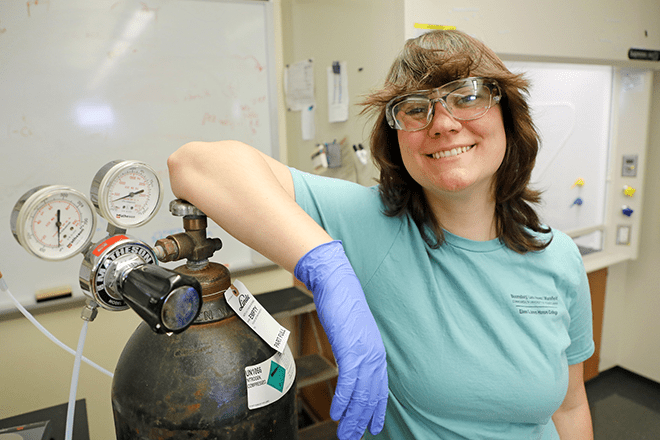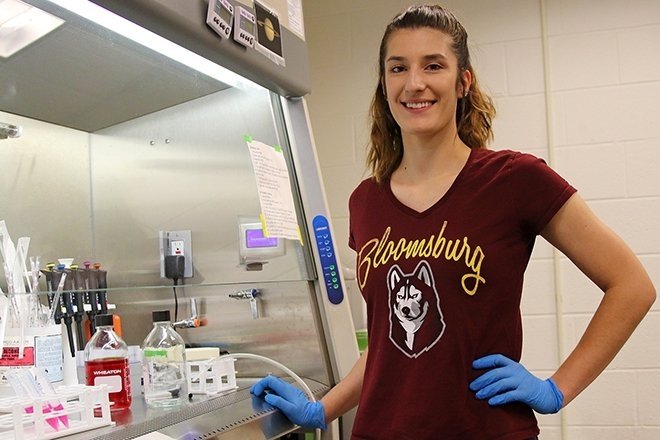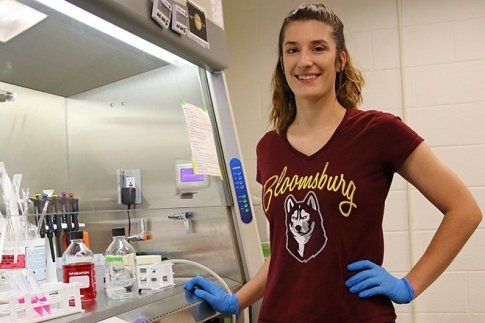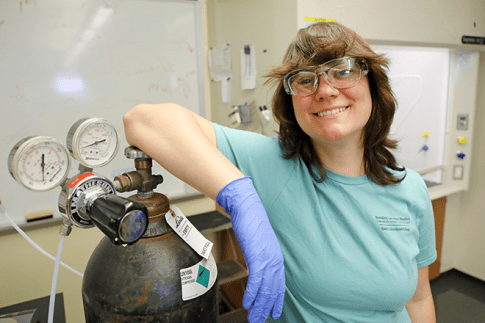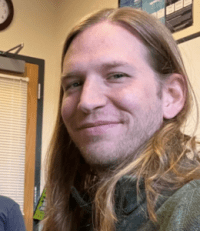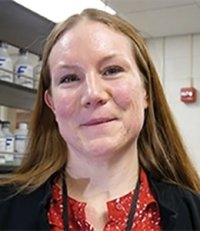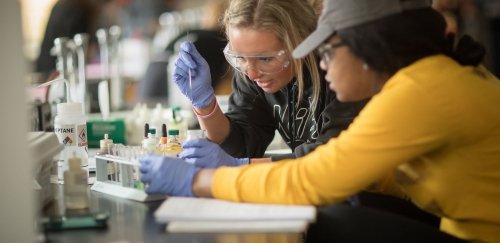
Chemistry
Small class sizes, hands-on labs, use of cutting-edge instruments, and the high-impact practice of one-on-one faculty-mentored research gets you ready for success in whatever path in chemistry you choose.
- Degrees & Offerings
-
- B.A.
- B.S.
- Location
-
- Bloomsburg
- Lock Haven
- Mansfield
Major Showcase Day
Get a behind-the-scenes look at our program during the Pre-Medical/Pre-Professional Major Showcase Day on Friday, April 18, 2025 on the Bloomsburg campus.
Space is limited for these events, register today!
Your place in chemistry awaits.
We'll learn to gather, interpret, and disseminate data appropriately. We'll also retrieve, utilize, and apply a variety of chemistry resources. And most importantly, we'll recognize and minimize potential chemical and physical hazards in the laboratory. These lab and research skills and scientific knowledge will enhance your marketability and advance your preparation for graduate school, as well as your chosen career field.
Students may pursue a B.S. degree in chemistry, or choose from four other exciting concentrations: biochemistry, forensics, pre-medicine, and natural products. Our faculty represents a great diversity of interests and covers the major areas of analytical, inorganic, organic, physical, biochemistry.
Course Delivery Format
Bloomsburg
Face-to-Face
Online
Hybrid
Lock Haven
Face-to-Face
Online
Hybrid
Mansfield
Face-to-Face
Online
Hybrid
Clearfield
Face-to-Face
Online
Hybrid
Courses and Curriculum
The chemistry and biochemistry programs are approved by the American Chemical Society (ACS). Students who complete certain requirements may then have their degrees certified by ACS. The biochemistry and pre-medicine concentrations are also accredited by the American Society for Biochemistry and Molecular Biology (ASBMB). Students in these concentrations can have their degree certified after completing the ASBMB exam.
This program provides a three-year exposure to the core of the chemistry curriculum. You can double major in chemistry and another discipline, or you can participate in the 3:2 program in engineering.
Also includes a "3 + 4" B.A.-D.O. program with the Philadelphia College of Osteopathic Medicine (PCOM)
No matter what degree or track you pursue the first two years of study is very much the same for all chemistry majors.
A degree in Chemistry from CU will prepare you for a rewarding career as a chemist in industry, government, research institutes, technical sales, and for graduate studies in all fields of chemistry. By completing a research project with a faculty member and earning at least a 2.7 GPA in your chemistry courses your degree will be certified by the American Chemical Society.
Topics covered include:
- Biochemistry
- Analytical Chemistry
- Inorganic Chemistry
- Organic Chemistry
- Physical Chemistry
- Faculty-mentored independent research
Degree Requirements Degree Works
Note: Degree requirements effective for enrolled students beginning Fall 2023. All enrolled students, including matriculating students prior to Fall 2023, can review their degree program requirements and track progress to degree completion with our degree audit and advisement tool, Degree Works.
The concentration in biochemistry ACS, ASBMB was developed in response to the recent explosive growth of the biotechnology industry and to attention to biological problems by all industrial sectors.
The biochemistry concentration at CU will prepare you for a specialized career as a biochemist in industry, government, research institutes, technical sales, and for graduate studies in the fields of biochemistry, pharmacy, or medicine.
Topics covered include:
- Foundational coursework in the 5 major areas of chemistry
- A full year of biochemistry course and lab work
- Basic and advanced biology courses with laboratory
- Faculty-mentored independent research or an internship
Degree Requirements Degree Works
Note: Degree requirements effective for enrolled students beginning Fall 2023. All enrolled students, including matriculating students prior to Fall 2023, can review their degree program requirements and track progress to degree completion with our degree audit and advisement tool, Degree Works.
The B.S. degree in chemistry with a forensics ACS concentration is designed for students who want a chemistry education that concentrates on the rapidly growing field of forensic science. This degree program includes a core chemistry curriculum combined with courses in criminal justice and physics that emphasize evidence collection, analysis, interpretation, and presentation of physical evidence that will combine the breadth of the field with a depth of understanding.
Our program combines the core chemistry degree, which is necessary for students to understand the scope, depth, and background of the scientific theory as well as the laboratory skills necessary to become a forensic scientist, as well as offering several specialized courses in forensic science in order to give students context in the specifics of the field.
Some career opportunities for students completing this program include employment in pharmaceutical, biomedical, and forensic science laboratories. Students seeking careers in forensic science may be subject to background checks similar to those required for law enforcement officers as a condition of employment. This program is excellent preparation for graduate study in forensic chemistry and analytical chemistry. The program follows the Forensic Sciences recommended curriculum.
The Forensic Chemistry concentration at CU combines specially selected courses from Chemistry and Criminal Justice to prepare you for a career as an analyst in a government or private sector forensic laboratory or graduate studies in forensic science.
Topics covered include:
- Foundational coursework in the 5 major areas of chemistry
- Courses in Criminal Investigation and Procedure
- Faculty-mentored independent research or an internship
Degree Requirements Degree Works
Note: Degree requirements effective for enrolled students beginning Fall 2023. All enrolled students, including matriculating students prior to Fall 2023, can review their degree program requirements and track progress to degree completion with our degree audit and advisement tool, Degree Works.
The Natural Products ACS concentration within Commonwealth University's B.S. in Chemistry degree program is designed to prepare students for success in established and emerging industries relating to plant extract production, purification, and analysis. The core of the program is Commonwealth University's chemistry degree, featuring its American Chemical Society-certified curriculum. The addition of specific courses in plant biology and hands-on experiences in extraction science enhances that degree toward the goal of providing qualified personnel for a variety of occupations requiring plant extraction skills, including occupations in the pharmaceutical, medicinal marijuana, brewing, vinification, food, cosmetic, and perfumery industries.
More information coming soon.
Secondary education chemistry and physical science teachers are in high demand across the country. CU’s renowned chemistry program and tradition of training great teachers provide the perfect combination of content knowledge and teaching methods to prepare you for a rewarding teaching career.
Degree Requirements Degree Works
Note: Degree requirements effective for enrolled students beginning Fall 2023. All enrolled students, including matriculating students prior to Fall 2023, can review their degree program requirements and track progress to degree completion with our degree audit and advisement tool, Degree Works.
A Minor in Chemistry shall be awarded when you obtain a 2.0 grade point average in the following prescribed courses. In addition to meeting the GPA requirement, you'll be expected to meet with your minor advisor before scheduling the electives.
Chemistry (B.A.)
- Demonstrate knowledge and comprehension in the five foundational areas of chemistry (Organic, Inorganic, Physical, Analytical, Biochemistry).
- Demonstrate the ability to apply critical, analytical, and integrative thinking to chemistry problems
- Apply the scientific method to design and conduct research/laboratory work, including analyzing and interpreting data
- Access, utilize, communicate information (information literacy) in an ethical and responsible manner.
- Understand important safety principles in chemistry laboratories and demonstrate safe use of instrumentation
Chemistry ACS (B.S.)
- Demonstrate knowledge and comprehension in the five foundational areas of chemistry (Organic, Inorganic, Physical, Analytical, Biochemistry).
- Demonstrate the ability to apply critical, analytical, and integrative thinking to chemistry problems
- Apply the scientific method to design and conduct research, including analyzing and interpreting data
- Access, utilize, communicate information (information literacy) in an ethical and responsible manner.
- Clearly communicate chemistry information with scientists and the general public in both written and oral form
- Understand important safety principles in chemistry laboratories and demonstrate safe use of instrumentation
Chemistry ACS, ASBMB Biochemistry (B.S.)
- Demonstrate knowledge and comprehension in the five foundational areas of chemistry (Organic, Inorganic, Physical, Analytical, Biochemistry).
- Demonstrate the ability to apply critical, analytical, and integrative thinking to chemistry problems
- Apply the scientific method to design and conduct research, including analyzing and interpreting data
- Access, utilize, communicate information (information literacy) in an ethical and responsible manner.
- Clearly communicate chemistry information with scientists and the general public in both written and oral form
- Understand important safety principles in chemistry laboratories and demonstrate safe use of instrumentation
Chemistry ACS Forensics (B.S.)
- Demonstrate knowledge and comprehension in the five foundational areas of chemistry (Organic, Inorganic, Physical, Analytical, Biochemistry).
- Demonstrate the ability to apply critical, analytical, and integrative thinking to chemistry problems
- Apply the scientific method to design and conduct research, including analyzing and interpreting data
- Access, utilize, communicate information (information literacy) in an ethical and responsible manner.
- Clearly communicate chemistry information with scientists and the general public in both written and oral form
- Understand important safety principles in chemistry laboratories and demonstrate safe use of instrumentation
Chemistry ACS Natural Products (B.S.)
- Demonstrate knowledge and comprehension in the five foundational areas of chemistry (Organic, Inorganic, Physical, Analytical, Biochemistry).
- Demonstrate the ability to apply critical, analytical, and integrative thinking to chemistry problems
- Apply the scientific method to design and conduct research, including analyzing and interpreting data
- Access, utilize, communicate information (information literacy) in an ethical and responsible manner.
- Clearly communicate chemistry information with scientists and the general public in both written and oral form
- Understand important safety principles in chemistry laboratories and demonstrate safe use of instrumentation
Chemistry Pre-Medicine ASBMB (B.S.)
- Demonstrate knowledge and comprehension in the five foundational areas of chemistry (Organic, Inorganic, Physical, Analytical, Biochemistry).
- Demonstrate the ability to apply critical, analytical, and integrative thinking to chemistry problems
- Apply the scientific method to design and conduct research, including analyzing and interpreting data
- Access, utilize, communicate information (information literacy) in an ethical and responsible manner.
- Clearly communicate chemistry information with scientists and the general public in both written and oral form
- Understand important safety principles in chemistry laboratories and demonstrate safe use of instrumentation
Chemistry Minor
Upon completion of the minor students will be able to:
- Demonstrate proficiency in the laboratory practice in chemistry.
- Demonstrate knowledge of core concepts in chemistry (symbiosis of structure to molecular activity)
- Demonstrate the ability to apply critical, analytical, and integrative thinking to chemical problems
- Demonstrate skill using appropriate scientific methods and instruments
- Clearly communicate scientific ideas in both written and oral form
Program Highlights
The B.S. degree in chemistry with a forensics ACS concentration is designed for students who want a chemistry education that concentrates on the rapidly growing field of forensic science. This degree program includes a core chemistry curriculum combined with courses in criminal justice and physics that emphasize evidence collection, analysis, interpretation, and presentation of physical evidence that will combine the breadth of the field with a depth of understanding.
Our program combines the core chemistry degree, which is necessary for students to understand the scope, depth, and background of the scientific theory as well as the laboratory skills necessary to become a forensic scientist, as well as offering several specialized courses in forensic science in order to give students context in the specifics of the field.
The Forensic Chemistry concentration at CU combines specially selected courses from Chemistry and Criminal Justice to prepare you for a career as an analyst in a government or private sector forensic laboratory or graduate studies in forensic science.
Topics covered include:
- Foundational coursework in the 5 major areas of chemistry
- Courses in Criminal Investigation and Procedure
- Faculty-mentored independent research or an internship
Some career opportunities for students completing this program include employment in pharmaceutical, biomedical, and forensic science laboratories. Students seeking careers in forensic science may be subject to background checks similar to those required for law enforcement officers as a condition of employment. This program is excellent preparation for graduate study in forensic chemistry and analytical chemistry. The program follows the Forensic Sciences recommended curriculum.
Additional career options to include:
- Forensic Scientist: Working in crime labs, forensic scientists analyze physical evidence from crime scenes. They use chemistry to identify substances, such as drugs or explosives, and interpret findings to support criminal investigations.
- Toxicologist: As a toxicologist, you would study the effects of chemicals on the human body. This role often involves working with law enforcement and medical examiners to understand how substances contribute to criminal activities or accidental deaths.
- Criminalist: Criminalists are specialized forensic scientists who apply principles of physical and natural sciences to analyze evidence. This includes comparing materials like hair, fibers, and bodily fluids, and producing detailed reports that may be used in court.
- Laboratory Technician: Many graduates start their careers as lab technicians in forensic labs, gaining hands-on experience in chemical analysis under the supervision of senior chemists and toxicologists.
- Crime Scene Investigator: While more commonly known for their role at crime scenes, some crime scene investigators specialize in chemical analysis, collecting and examining physical evidence from crime scenes.
Our Chemistry Pre-Medical Sciences program helps prepare you for entry into post baccalaureate schools in the medical professions: medical school, dental school, veterinary school, podiatry school, pharmacy school, and optometry school.
Chemistry Pre-Medical Sciences students have a Pre-Medical Science Advisor to advise them in coursework and in other important facets of pre-professional preparation. Our experienced advisors know the ins and outs of applying to professional schools.
At Commonwealth University, professors with advanced degrees in their field teach all lectures and labs. Most have doctorates, and each professor is here because they love to teach.
Our courses provide the rigor needed to develop critical thinking and analysis skills, not only required to perform well on today’s MCAT, OAT, DAT, and GRE, but also for success in your professional school curriculum. Our graduates are well prepared for courses in professional school. Our courses provide the rigor needed to develop critical thinking and analysis skills, not only required to perform well on today’s MCAT, OAT, DAT, and GRE, but also for success in your professional school curriculum. Our graduates are well prepared for courses in professional school.
Pre-Med Sciences Seminar: When you apply to professional school, the Pre-Medical Sciences Seminar course will help you stay on track with preparing your application.
Recent medical and professional school placement includes:
- Brown University, School of Medicine
- Temple University, School of Dentistry
- Yale College of Medicine
- Albert Einstein College of Medicine
- West Virginia University College of Medicine
- Drexel University College of Medicine
- Edward Via College of Osteopathic Medicine (Virginia Tech)
- Pennsylvania College of Osteopathic Medicine
Commonwealth University also has affiliations with:
- Philadelphia College of Osteopathic Medicine
- Geisinger Commonwealth School of Medicine
- 3+4 Accelerated Pharmacy Program (Fairleigh Dickinson University)
- 3+4 Accelerated Pharmacy Program (Temple University)
Accreditation
Students who elect this degree are prepared to assume careers in food, pharmaceutical, oil, and chemical industries. Chemists are often involved in quality control, research, sales, monitoring employee environments, and agencies requiring analytical skills. Chemistry graduates are very competitive in the retail and wholesale professions. Over half of our chemistry graduates continue on to graduate school.

American Chemical Society, ACS-approved programs offer a broad-based and rigorous chemistry education that gives students intellectual, experimental, and communication skills to become effective scientific professionals.

The American Society for Biochemistry and Molecular Biology helps you excel at all stages of your scientific career through networking, professional development, meetings, journals and leadership opportunities.
Catalyze Your Future
Clubs and Organizations
Chemistry Club
A student organization for chemistry majors and other interested students. Chemistry Club members participate in various activities together, such as coming up with events to celebrate National Chemistry Week (NCW) on campus and in the community.
American Chemical Society
The American Chemical Society is the national organization of professional and academic chemists. Annual meetings take place at the regional level and biannual meetings at the national level. Commonwealth University chemistry majors often attend regional meetings to present research.
Corning Section of the American Chemical Society
A local organization of professional chemists from Corning, Inc. and GTP; and academic chemists from the seven colleges in the section. In the spring, there is a meeting dedicated to the presentation of research from the area colleges, and Commonwealth University typically enters three or more researchers.
Careers
Graduates are well-prepared for a changing job market or for further study in chemistry. Many of our students have found successful careers in the following areas:
Potential Job Opportunities
- Medicine
- Dentistry
- Optometry
- Patent Law
- Pharmacy
- Pharmaceutical Industries
- Biotechnology Industries
- Food Industries
- Cosmetics Industries
- Biomedical Industries
- Semiconductor Industries
- Microelectronic Industries
- Optoelectronic Industries
Chemistry Program Contacts
Applying to This Program
Apply
-
Application Process
Review the step-by-step process whether you're a first-year student, transferring to CU, or more.
-
Apply Now
By starting your application, you gain access to your personalized application portal to view your progress.
-
Scholarships
As the largest comprehensive university in north central and northeastern Pennsylvania, CommonwealthU works hard to provide a world-class education that consistently rates among the best values in the nation.
Explore More
-
Explore Commonwealth University
There's no better way to learn more than to experience Commonwealth University for yourself! Set up a campus tour or connect with us virtually.
-
Connect with Your Admissions Counselor
Applying to college is a big step. You have questions, and we have answers!
-
Understanding Financial Aid
Financial Aid can be a complex topic. Our Financial Aid team is here to tell you what you need to know and help you navigate the financial aid process.

